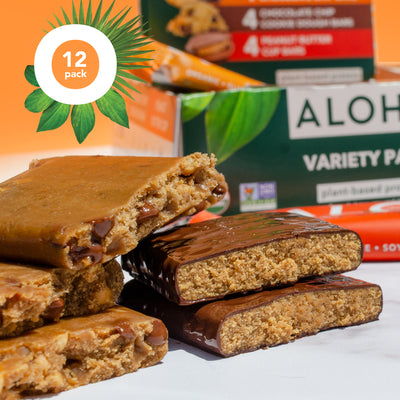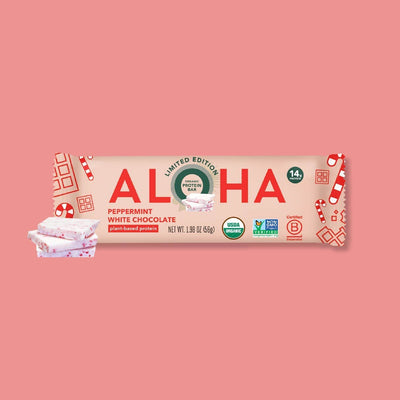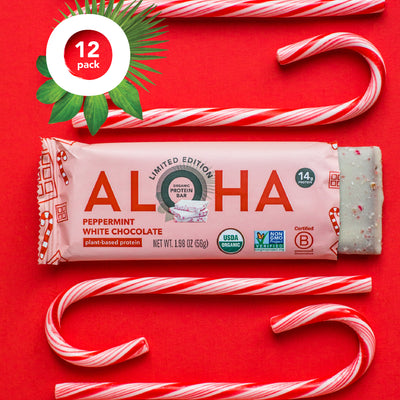Key Takeaways:
- Hidden Sources of Gluten: Some protein powders may contain gluten due to added ingredients or cross-contamination during manufacturing.
- Trust Certified Labels: Certified gluten-free labels are the most reliable way to ensure your protein powder is safe for gluten-sensitive diets.
- Why Choose ALOHA: ALOHA protein powders are gluten-free, soy-free, plant-based, and made with good ingredients that support your health and the planet.
As a Certified B Corp and employee-owned company, ALOHA is proud to lead the way in clean, plant-based nutrition that supports people and the planet. Our products are crafted with organic ingredients, always soy-free and gluten-free, and made for those who care about what they put into their bodies—and where it comes from. When you choose ALOHA, you're choosing more than just a protein powder. You're choosing a movement rooted in transparency, sustainability, and community impact.
Protein powder is a staple in many wellness routines, whether you're blending up a smoothie after a workout or adding a boost to your morning oats. But if you're avoiding gluten, things can get tricky. Gluten has a way of sneaking into unexpected places—including protein supplements. Not all protein powders are created equal, and the presence of gluten can vary depending on the ingredients, flavorings, and even how the product is processed.
In this piece, we’ll be discussing whether protein powder contains gluten, how to identify safe options, and why ALOHA’s clean, plant-based protein powders are a worry-free choice for gluten-free living.
What Is Gluten, And Why Do People Avoid It?
Gluten is a type of protein found in grains like wheat, barley, and rye. For most people, gluten isn’t an issue—but for some, it can be. People with celiac disease, gluten sensitivity, or wheat allergies often avoid gluten to feel their best. Even without a medical reason, many choose to go gluten-free to support digestion or reduce processed ingredients in their diet.
Avoiding gluten isn’t just about skipping bread or pasta. It can show up in places you wouldn’t expect—like sauces, snacks, and even supplements like protein powder. That’s why understanding where gluten hides is important if you're trying to steer clear of it.
Does Protein Powder Contain Gluten?
Not all protein powders are the same—and some do contain gluten. It usually depends on the ingredients and how the product is made. Protein powders made from wheat or with added flavorings, thickeners, or fillers may contain gluten. Even cross-contamination during manufacturing can introduce gluten, especially if the facility also processes gluten-containing ingredients.
If you're trying to avoid gluten, it's important to look for clear labeling. Some brands go the extra mile to test and certify their products as gluten-free, while others may not mention it at all. When in doubt, choose a brand that’s transparent about what goes into their products and how they’re made.
How To Know If A Protein Powder Is Gluten-Free
Reading labels is your best tool. If a protein powder is certified gluten-free, that means it’s been tested and meets strict standards. Look for certifications or clear statements like “gluten-free” right on the packaging.
But labels don’t always tell the full story. It’s helpful to check the ingredient list for anything suspicious—like wheat protein, malt, or vague terms like “natural flavors.” When in doubt, visit the brand’s website or contact them directly for clarity. Brands that care about your health are usually happy to be transparent.
Going for plant-based options can also help, as these are often simpler and more naturally gluten-free. Just remember: “plant-based” doesn’t automatically mean “gluten-free,” so always double-check.
How To Know If A Protein Powder Is Gluten-Free
If you're trying to avoid gluten, knowing how to spot a safe protein powder can make a big difference. Here's what to look for when choosing a gluten-free option:
Check For A Gluten-Free Certification
The easiest way to be sure is to look for a gluten-free certification seal on the package. This means the product has been tested and meets safety standards for gluten content—usually less than 20 parts per million (ppm), which is considered safe for most gluten-sensitive individuals.
Read The Ingredient List Carefully
Scan the label for red flags like wheat protein, barley, or malt. Also, watch for vague terms like “natural flavors” or “modified food starch,” which can sometimes include gluten unless specified otherwise.
Look Beyond The Label
Not all brands provide full details on packaging, especially if their products are made in shared facilities. Visit the brand’s website or reach out to customer service to ask how their protein is processed and whether they test for gluten contamination.
Consider Plant-Based Protein Options
Plant-based protein powders—like those made from peas, brown rice, or hemp—are often naturally gluten-free. But keep in mind that “plant-based” doesn’t always mean “gluten-free,” especially if there are added ingredients or shared equipment during production.
Why ALOHA Protein Powders Are A Gluten-Free Choice
At ALOHA, we believe feeling good starts with trusting what’s in your food. That’s why every ALOHA protein powder is certified gluten-free—so you can enjoy it with confidence:
Certified Gluten-Free And Soy-Free
Our protein powders are made without gluten or soy, and every batch is tested to meet strict gluten-free standards. We keep it clean and simple, because we know that what’s not in your food matters just as much as what is.
Plant-Based And Packed With Good Ingredients
ALOHA uses organic, plant-based proteins from sources like peas and brown rice. That means you’re getting the nutrition you want without unnecessary additives—and it’s all crafted to support your wellness naturally.
Made With Care For People And The Planet
As an employee-owned, Certified B Corp, we’re committed to doing business the right way. That means sustainable practices, thoughtful ingredients, and giving back to communities—all while making products you can trust.
Try Chocolate Or Vanilla Protein Powder
Whether you're blending up a smoothie or baking something nourishing, our Chocolate Protein Powder and Vanilla Protein Powder are delicious ways to go gluten-free. Each flavor is smooth, satisfying, and made with ingredients you can feel good about.
Choosing The Right Protein Powder For Your Lifestyle
Finding the right protein powder isn’t just about avoiding gluten—it’s about choosing something that fits into your daily routine and supports your goals. Whether you're fueling up after a workout, mixing a quick breakfast, or adding a boost to your baking, your protein should work for you:
Think About Your Daily Habits
Do you blend smoothies, bake protein snacks, or just need something quick and easy? Look for a protein powder that’s versatile and convenient to use in the ways you enjoy most.
Check The Ingredient Quality
High-quality, organic ingredients make a big difference in how a protein powder tastes and how it supports your body. ALOHA’s plant-based ingredients are simple, clean, and thoughtfully sourced—so you never have to second-guess what you’re putting in your body.
Stay True To What Matters To You
Gluten-free, soy-free, plant-based—these choices reflect more than just your diet. They represent how you care for your health, your community, and the planet. ALOHA protein powders are made to align with all of those values, without sacrificing taste or convenience.
Final Thoughts
Going gluten-free doesn’t have to mean giving up flavor or nutrition. With the right protein powder, you can fuel your body, support your lifestyle, and feel confident about what you're choosing—every single day.
ALOHA protein powders are crafted to give you peace of mind with every scoop. They’re gluten-free, soy-free, and full of plant-based goodness, made by a company that cares about more than just products. From our ingredients to our impact, we’re here to help you feel good—naturally.
Read also:
- Benefits Of Superfoods: Why They Boost Your Health
- Superfood Recipes: Easy And Healthy Meal Ideas
- How Long Does Protein Stay In Your System? Key Facts
Frequently Asked Questions About If Protein Powder Has Gluten
Is gluten naturally present in protein powders?
No, gluten isn’t naturally found in most protein sources like peas, rice, or whey. However, it can be introduced through added ingredients or during processing, especially in facilities that handle gluten-containing products.
Are whey protein powders always gluten-free?
Not always. While pure whey isolate is typically gluten-free, some whey protein products include flavorings or additives that may contain gluten. It’s important to verify with the brand or look for a certified gluten-free label.
Can flavored protein powders contain hidden gluten?
Yes, flavored varieties often include ingredients like thickeners or natural flavors that can sometimes contain gluten. Always double-check the ingredient list and look for certification when in doubt.
Does cross-contamination affect gluten content in protein powders?
It can. If a protein powder is made in a facility that processes wheat, rye, or barley, there's a risk of cross-contamination unless the product is specifically tested and certified gluten-free.
Why do some people react to protein powders even if they're labeled gluten-free?
Some individuals have sensitivities beyond gluten or may react to other ingredients like dairy, soy, or artificial sweeteners. It’s also possible the product has trace amounts of gluten from cross-contact, depending on manufacturing standards.
Are there benefits to choosing gluten-free protein powder even if you’re not gluten-sensitive?
Yes. Many people choose gluten-free options to simplify their diet, avoid processed ingredients, or reduce inflammation, even if they don’t have gluten intolerance.
How can I tell if a protein powder is third-party tested for gluten?
Look for seals from organizations like the Gluten-Free Certification Organization (GFCO). Brands may also disclose third-party testing details on their website or product packaging.
Can gluten-free protein powder be used in baking?
Absolutely! Many gluten-free protein powders, including those from ALOHA, blend well in baking recipes and smoothies. Just be sure your other ingredients are also gluten-free if needed.
Do all plant-based protein powders avoid gluten?
Not necessarily. While plant-based powders are often gluten-free, some may include added grains or flavorings that contain gluten. Always read the full ingredient list.
What makes ALOHA protein powder a safer choice for gluten-free living?
ALOHA protein powders are not only certified gluten-free but also soy-free and made from clean, plant-based ingredients. Plus, ALOHA is an employee-owned Certified B Corp, committed to high-quality products and responsible business practices.
Sources:
1. Langyan, S., Yadava, P., Khan, F. N., Dar, Z. A., Singh, R., & Kumar, A. (2022). Sustaining Protein Nutrition Through Plant-Based Foods. Frontiers in Nutrition, 8(772573). https://doi.org/10.3389/fnut.2021.772573
2. Hertzler, S. R., Lieblein-Boff, J. C., Weiler, M., & Allgeier, C. (2020). Plant Proteins: Assessing Their Nutritional Quality and Effects on Health and Physical Function. Nutrients, 12(12), 3704. https://doi.org/10.3390/nu12123704
3. Plant Protein - an overview | ScienceDirect Topics. (n.d.). Www.sciencedirect.com. https://www.sciencedirect.com/topics/agricultural-and-biological-sciences/plant-protein
4. Silva, A. R. A., Silva, M. M. N., & Ribeiro, B. D. (2020). Health issues and technological aspects of plant-based alternative milk. Food Research International, 131, 108972. https://doi.org/10.1016/j.foodres.2019.108972
5. Niland, B., & Cash, B. D. (2018). Health Benefits and Adverse Effects of a Gluten-Free Diet in Non–Celiac Disease Patients. Gastroenterology & Hepatology, 14(2), 82. https://pmc.ncbi.nlm.nih.gov/articles/PMC5866307/
6. Shahnaz, T., Fawole, A. O., Adeyanju, A. A., & Onuh, J. O. (2024). Food Proteins as Functional Ingredients in the Management of Chronic Diseases: A Concise Review. Nutrients, 16(14), 2323. https://doi.org/10.3390/nu16142323
ALOHA's products are not intended to treat, diagnose, mitigate, prevent, or cure disease. ALOHA's products should not replace prescribed medications or the variety of foods important to a healthful diet.
Do not self-diagnose any health condition. Work with your healthcare provider to determine how best to achieve optimal health.












